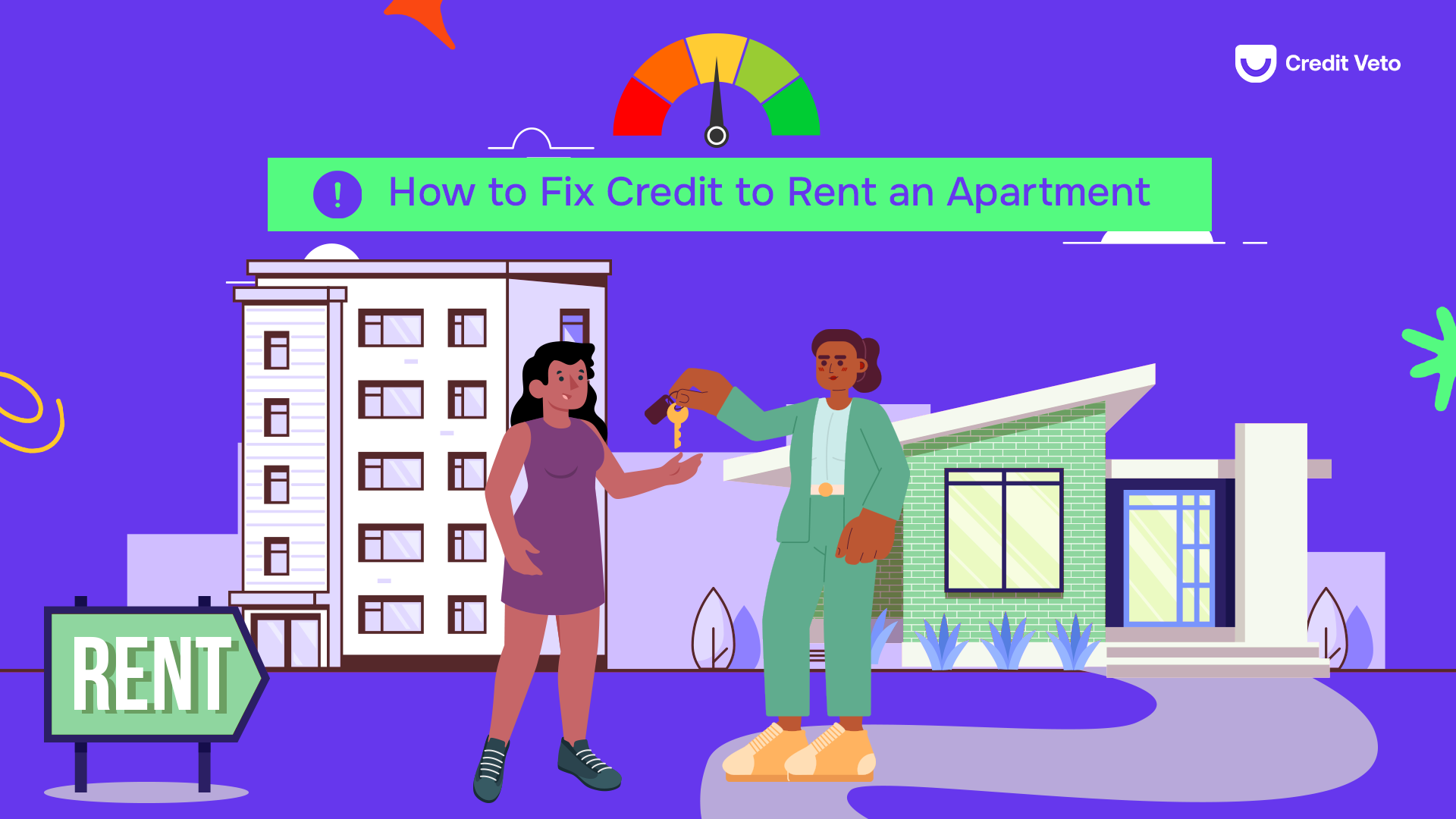Mortgage Issues? This is How to Fix Credit to Rent an Apartment
Struggling to rent an apartment due to bad credit? Learn more eight actionable steps on how to fix your credit, improve your score, and secure that apartment lease with confidence.

Renting an apartment is a significant milestone, but when your credit score is less than ideal, it can feel like a huge barrier. Many landlords and property management companies use credit reports to assess potential tenants, and a low credit score could make it harder to get approved for your next place.
If you're wondering how to fix your credit to rent an apartment, whether it is a random work building or your dream home, you’re not alone—many people face similar challenges daily. While bad credit doesn’t mean you’re completely out of luck, it does mean that you may need to take some proactive steps to improve your credit score and demonstrate to landlords that you're a reliable tenant.
In this blog post, we’ll walk you through what you can do to fix your credit and improve your chances of securing that apartment. We’ll also cover key strategies, including how to dispute negative items, build credit history, and more. Don’t skip any part, as they are all crucial.
Why Landlords Check Your Credit Before Renting to You
Before we get into fixing your credit, let’s briefly discuss why landlords check your credit in the first place. They use your credit score and credit report to evaluate your financial responsibility and trustworthiness as a tenant. A good credit score signals to them that you're likely to pay rent on time, which is why landlords use credit checks as part of their screening process. Make sense, right?
Here’s what a credit report can reveal to a landlord:
- Payment History: This includes your record of paying bills, loans, and credit cards.
- Credit Utilization: How much of your available credit you’re using compared to your total credit limit.
- Debt-to-Income Ratio: A high amount of debt relative to income can raise concerns.
- Collections and Charge-Offs: If you have any overdue debts that have been sent to collections, this could hurt your chances.
With this in mind, landlords generally prefer tenants with a good to excellent credit score (typically above 650), but that doesn’t mean you can’t rent if your credit is less than perfect. Let’s now explore how you can fix your credit to rent an apartment.
Steps to Fix Your Credit Before Renting an Apartment
Before signing any lease or handing over a deposit, step back and take these crucial actions to ensure your credit is ready. These steps will not only improve your chances of getting approved but can also help you avoid higher deposits, rejections, or bad rental terms.
Step 1: Get a Copy of Your Credit Report
The first step in fixing your credit is to obtain a copy of your credit report and check it for free. This will allow you to see where you stand and identify any negative marks that could impact your rental application.
You can request a free copy of your credit report from each of the three major credit bureaus—Experian, Equifax, and TransUnion—once per year at AnnualCreditReport.com but with Credit Veto, you check it anytime. You may also find it helpful to request your score, as many landlords focus on your score in addition to the report.
Once you have your report, go over it carefully and take note of the following:
- Late payments: These can drag your score down and make it harder to rent.
- Collections: Any past-due debts that have been sent to collections can impact your approval chances.
- Credit inquiries: Too many hard inquiries can hurt your credit score, though their impact is typically small.
Step 2: Dispute Inaccuracies on Your Credit Report
If you find errors or inaccurate information on your credit report, you can dispute them. Common mistakes include incorrect payment dates, wrong account balances, or accounts that don’t belong to you.
According to the Consumer Financial Protection Bureau (CFPB), nearly one in five Americans have errors on their credit report. Disputing these inaccuracies can result in them being removed, which could lead to a quick boost in your credit score.
To dispute an error:
- Contact the credit bureau reporting the error.
- Provide supporting evidence, such as account statements or payment confirmations.
- Wait for the credit bureau to investigate the dispute (usually within 30 days).
Removing incorrect negative items from your credit report can be a quick win in improving your score and increasing your chances of renting the apartment you want.
Step 3: Pay Down High Credit Card Balances
Credit utilization (the ratio of how much of your available credit you’re using) accounts for 30% of your credit score. If you’re carrying high balances on your credit cards, it’s time to start paying them down.
- Goal: Aim to keep your credit utilization under 30%, ideally below 10%.
- Strategy: Focus on paying down cards with the highest interest rates first (the debt avalanche method) or tackle the smallest balances first for momentum (the debt snowball method).
Reducing your credit utilization not only helps boost your credit score but also demonstrates to landlords that you're working to manage your finances responsibly.
Step 4: Settle or Dispute Collections
If you have collections accounts on your report, this is one of the most significant hurdles to overcome when fixing your credit to rent an apartment. Collection accounts can stay on your credit report for up to 7 years, even after the debt is paid.
How to Deal with Collections:
- Dispute any inaccuracies: As mentioned earlier, if there are errors on your collection account (e.g., the debt isn’t yours or the amount is wrong), you can dispute it with the credit bureaus.
- Negotiate settlements: If the collection account is valid, consider negotiating a settlement with the collection agency. In some cases, they may agree to accept a lower payment in exchange for removing the collection from your report (known as Pay for Delete).
Settling or removing collections will have a positive impact on your credit score and improve your ability to qualify for an apartment.
Step 5: Build Your Credit with a Secured Credit Card
If your credit is thin (i.e., you don’t have enough credit history to generate a score), you may need to build it up. One way to do this is by using a secured credit card.
A secured credit card requires a deposit that acts as your credit limit, but it functions like any other credit card. As you use the card responsibly and make on-time payments, you’ll build a positive payment history, which will improve your credit score.
- Pro Tip: Make sure to keep your utilization under 30% to maximize your score.
Step 6: Show Proof of Rent Payment
If you’ve been renting but have bad credit, showing proof of timely rent payments can help. Many landlords will consider a history of on-time rent payments as part of their screening process.
There are services that can report your rent payments to the credit bureaus, which can help boost your score over time. It’s also worth mentioning in your rental application that you have a strong history of paying your rent on time.
Step 7: Provide a Larger Security Deposit or Co-Signer
If your credit score is still low after your efforts to repair it, you might still have options. You can offer a larger security deposit or find a co-signer to vouch for your ability to pay rent.
A larger deposit reduces the landlord’s risk, and a co-signer with better credit can offer peace of mind to the property owner.
Step 8: Work with a Credit Repair Company
If you’ve tried these steps but need help, consider working with a credit repair service. A professional service like Credit Veto can assist you in disputing negative items, negotiating settlements, and offering strategies to improve your credit score more efficiently.
How Long Does It Take to Fix Your Credit to Rent an Apartment?
The timeline for repairing your credit and renting an apartment depends on the severity of the issues on your credit report. On average, here’s what you can expect:
- 1–3 months: If you only have a few late payments or high credit utilization, you may start seeing improvements in a few months.
- 3–6 months: If you have collections, disputes, or more serious credit issues, it might take 3 to 6 months to see significant changes.
- 6–12 months: For major credit issues like bankruptcy, it could take 6 to 12 months or longer to fully fix your credit.
Conclusion
Fixing your credit to rent an apartment requires time, effort, and strategy. By addressing your credit utilization, disputing errors, settling collections, and building credit, you’ll improve your chances of renting the place you want.
In some cases, it might take months of consistent effort, but even small improvements can help you secure that lease.
Ready to fix your credit and improve your chances of renting an apartment? Start with Credit Veto, where we offer professional credit repair services designed to help thousands of Americans like you take control of your financial future.
Get in touch with us today and start repairing your credit to rent that dream apartment!




Comments ()